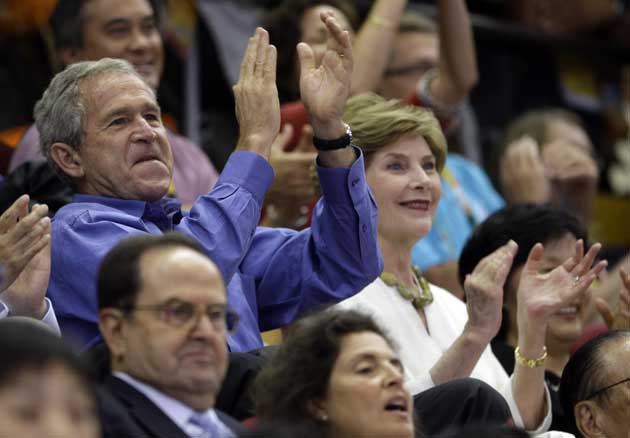Bush steps up pressure on China with call for religious freedom

Your support helps us to tell the story
From reproductive rights to climate change to Big Tech, The Independent is on the ground when the story is developing. Whether it's investigating the financials of Elon Musk's pro-Trump PAC or producing our latest documentary, 'The A Word', which shines a light on the American women fighting for reproductive rights, we know how important it is to parse out the facts from the messaging.
At such a critical moment in US history, we need reporters on the ground. Your donation allows us to keep sending journalists to speak to both sides of the story.
The Independent is trusted by Americans across the entire political spectrum. And unlike many other quality news outlets, we choose not to lock Americans out of our reporting and analysis with paywalls. We believe quality journalism should be available to everyone, paid for by those who can afford it.
Your support makes all the difference.President George Bush attended a Christian service in Beijing yesterday to call for greater religious freedom in China but, in an indication of how religious persecution persists in the fiercely secular country, a leading local underground church activist was detained en route to the same ceremony.
Hua Huiqi was cycling to the Kuanjie church when he was stopped by security officers working with the religious affairs bureau. He and his brother were taken away and their bibles were seized.
Later, after the President and his wife, Laura, had attended the Protestant service, they gathered with parishioners on the front steps, where Mr Bush made some pointed remarks about religious freedom. "No state, man or woman should fear the influence of loving religion," he said.
The Sunday service was conducted in Chinese but translated for the Bush family, and a children's choir performed the hymn "Amazing Grace" in English and Chinese. "I had a very uplifting experience going to a church," Mr Bush said, adding that he felt very strongly about religion. He thanked President Hu Jintao for helping to arrange the visit. It was not clear if Mr Bush was aware of Mr Hua's detention.
As a Communist country, which favours dialectical materialism over transubstantiation, China strictly controls Christianity. Believers can only worship in officially approved churches such as the one Mr Bush visited yesterday. That means that millions of people pray privately in house churches, organised by underground church groups, to avoid detection.
As the US President was attending church, three American Christian activists were detained for protesting for religious freedom in Beijing's central Tiananmen Square. The members of the Christian Defence Coalition were arrested as they started a prayer vigil outside the Mao Zedong Memorial Hall.
Mr Bush's calls for greater religious tolerance come hard on the heels of critical remarks about China's human rights record that have already angered his hosts. Relations have been strained since his comments last week. Mr Hu was supposed to attend a ceremony to inaugurate the US embassy in Beijing on Friday but decided against.
Nobody knows how many Christians are in China. The official figure is 4 million Roman Catholics and 10 million Protestants, but other estimates, which include the underground churches, put the figure at 54 million, of whom 39 million are Protestant and 14 million Catholics. Christianity has a long history here, mainly from the Qing dynasty (1644-1911). After the First Opium War in 1842, missionaries – and especially the schools and universities they founded – played a significant role in Westernising China. Communist China threw out foreign churches in 1950.
Christianity is now organised into officially sanctioned organisations – the China Christian Council, the Three-Self Patriotic Movement and the Chinese Catholic Patriotic Association. It is to avoid these restrictive organisations that many Christians use the underground churches, but these are the subject of regular crackdowns by the police.
Mr Hua is one of the most prominent underground church activists in China and, in addition to his religious activism, he also helps people who have other civic complaints, such as those forced to move home for Olympic redevelopment. Police beat him unconscious in October when he tried to intercede for residents evicted by private security guards. He served six months last year for "obstructing justice" after he and his mother, 78, scuffled with police as they prepared to present a petition to government about the demolition of their home in 2001.
In this Olympic period, Mr Hua has been practically under house arrest, a victim of a tightening of restrictions to stamp out potential criticism or protests during the Games. His brother Huilin said he had been adamant about going to church on Sunday.
"I told him not to go because it's during the Olympic Games and this period is sensitive," Huilin said. "But he was determined to go because he said that church was where he was baptised. So I went with him hoping to protect him." Later, Huilin said Mr Hua had been able to escape from the location where he was being held because the security officials fell asleep.
Join our commenting forum
Join thought-provoking conversations, follow other Independent readers and see their replies
Comments